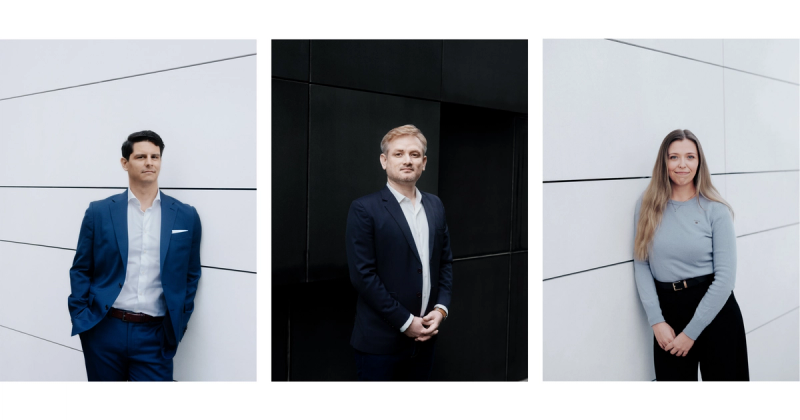Insights and guidance for those relocating to Norway for work
- Careers
Norway is a wonderful country to live in, but nonetheless, relocating to a new country is a big decision. It is important to do research beforehand to know what legal requirements you need to prepare before moving, as well as get help and guidance when possible. In this article, three of Marketer’s employees have shared their insight and experience with relocating, both the challenges that may arise and the positive aspects.

General requirements
Everyone who is working in Norway no matter the time period and where you are moving from must have either a national identity number or a D number. A D number is a temporary identification number that you will receive if you are staying in Norway for a short period of time. If you are staying for more than six months in addition to being registered as a resident you will be issued a national identity number. The identification number is needed for several purposes, such as paying your taxes. You will also need to apply for the tax deduction card, which is an electronic document showing how much tax your employer should deduct from your salary.
Non-EU/EEA citizens
If you wish to work in Norway and come from a country outside the EU/EEA, you will need to apply for a residence permit on the Norwegian Directorate of Immigration (UDI) website. There are different types of residence permits for work, and requirements for applying differ from occupations and individual situations. Hence, we recommend that you research the Norwegian Directorate of Immigration website about the specifics regarding the exact industry and personal situation that you are in.
For a skilled worker permit, you will need to show an offer of employment, as well as additional requirements such as completion of higher education. You will need the permit to be granted before you start working, however, it is possible to apply for early employment which you will receive from the police. You can find the requirements here.
EU/EEA and Nordic citizens
All EU/EEA citizens are allowed to move to Norway for work without a residence permit and can start working right away. However, you will have to register with the police within three months of arriving in the country.
Citizens from other Nordic countries are allowed to live, work and study without applying for a residence permit or registering with the police in Norway. Nevertheless, if you are living in Norway for more than six months you will need to register the relocation in the National Registry.
For additional information, we currently recommend this page regarding Covid-19 and the updated rules and regulations for entering and residing in Norway.
Insight from our employees
We have asked three of our employees to hear their take on how it was to apply for a residence permit and everything else that comes with relocating to Norway. The interviewees are Enguerran Licari (to the left), Muntazir Naqvi (in the middle) and Athina Anderssen Moe (to the right).

Enguerran Licari, Sales Executive at Marketer
Enguerran was based short-term in Norway with his girlfriend when he started at Marketer, as they were originally planning to move back to Myanmar. As he is from Monaco he did not need to apply for a residence permit but had to register the move.
- Were there any challenges while settling down in Norway?
My French passport allows me to stay in Norway to work without a visa, but I had to apply to the UDI for a D number and tax card, and a police registration of EU citizenship. Because of Covid, the waiting time is from 4 months to 8 months, so that made things quite difficult at one point. Another challenge was to open a bank account as it takes such a long time, and to this day it is still an ongoing process. A piece of advice to anyone who is having these challenges; be persistent. - Have you experienced any language barriers at work?
There was almost no language barrier problem at all, as everyone immediately switched to English when I walked into a room and took part in a conversation. I feel there is a lot of respect in that sense, and I am now taking Norwegian classes to play my part. The company is also organising lots of social events for everyone to meet and bond with each other which is great.
Muntazir Naqvi, Jr. Data Scientist at Marketer
Muntazir is originally from Pakistan and was already in Norway for his graduate studies in Data Science. He first discovered Marketer at university, as our data science team held a presentation in one of Muntazir’s lectures. As he was in Norway with a student visa he still had to apply for a skilled worker permit to be eligible for full-time work.
- How long did it take to apply for a skilled worker permit?
These days, there is a huge backlog at the Norwegian Directorate of Immigration, and visa processing times are as long as 4 months. However, after I submitted my application to the UDI, Marketer helped expedite the process by calling UDI and explaining the urgency, and I got the work permit in just five days. - How has it been after moving here permanently?
It is going great and I am enjoying my time here in Norway. I love the work environment at Marketer. My colleagues are super helpful, and we have motivated and energetic people across all teams. Because it has been less than a year since I moved to Norway, I would say that I am still in the transition phase, but Marketer has definitely helped me to hit the ground running and to cruise through.
Athina Anderssen Moe, Content Creator at Marketer
Although she is originally from Norway, Athina says she is Spanish at heart. She has lived in Alicante, Spain with her family since she was two years old, and moved to Norway for the first time in 21 years when she started at Marketer. As a Norwegian citizen, she only had to register her move.
- How was it to move back to Norway?
Due to the pandemic, it was quite difficult to get into Norway at that time, but Marketer was really flexible and understanding when it came to my starting date, as it is quite a big decision to move countries and on top of that having to quarantine. Other than that everything went very well, and as I am Norwegian I only had to register that I had moved back. - In terms of work, how has it been after the relocation?
Everything has been very good. One thing that can be challenging for me at times is that even though I am Norwegian, I never went to a Norwegian school, so my language is not where I want it to be at times. However, what I do notice is the huge benefit of being fluent in Spanish as we have a lot of international clients at work.
Norwegian culture
There is no secret that relocating can mean encountering some challenging situations, however, Norway has a lot to offer once you are settled and ready to explore. A fun place to start immersing yourself in a new culture is through food. Our colleagues speak warmly about their culinary experiences, where the brown cheese (Brunost), Norwegian salmon, Christmas soda and waffles are now on their list of top favourite foods. Our colleague Muntazir Naqvi also talks about how his previous and current perception of Norwegian people have changed since moving to Norway.
“Before moving here, I had heard that Norwegians are introverts. Perhaps it’s just my experience but that stereotyping is highly exaggerated. For example, at Marketer, we have weekly social events, thanks to a group of awesome people who take the responsibility of arranging these events and making sure everyone feels included.”


